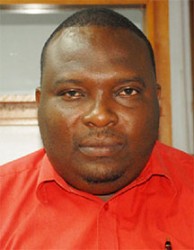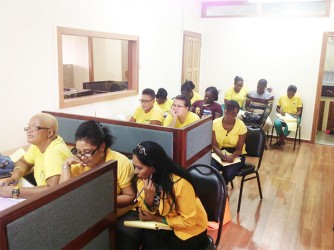Two expatriate companies are among six entities from the gold mining and quarrying sectors that will participate in an August 5 – 6 course in explosives blasting being run by the Guyana Mining School Inc.
Administrator/Coordinator of the Guyana Geology and Mines Commission (GGMC)-run Mining School John Applewhite-Hercules told Stabroek Business in an interview earlier this week that the two-day programme will address the theoretical aspects of explosives blasting. He said that while consideration had been given to adding a third day to the exercise to facilitate actual field work with explosives it had been decided that the logistics of such an undertaking were impracticable at this time. He said the participants in the current theoretical part of the course had already indicated that they were prepared to contribute to and participate in the practical programme.
Meanwhile, Applewhite-Hercules said that the Australian company Orica Mining Services had been selected to deliver the programme and would work in collaboration with the GGMC.
Orica is the largest provider of commercial explosives and blasting systems to the mining sector and is widely regarded as one of the global leaders in the provision of ground support in the mining and tunneling sectors. The company also supplies general chemicals across a diverse range of sectors.

John Applewhite-Hercules
Applewhite-Hercules said the company, which is already the authorised distributor for explosives in Guyana, is expected to expand its current nominal presence here. He said Orica had already indicated its preparedness to work with other local individuals and entities in the relevant sectors that might have an interest in undergoing more advanced training in sector-related explosives blasting and other mining-related pursuits.
Guyana Goldfields and the Australian mining outfit Troy Resources along with local quarrying companies, including BK International, Toolsie Persaud Ltd and Durban Quarries will be represented on the programme.
Applewhite-Hercules said the mining school had been engaged in discussions with the participants on the structure of the course, which he said was geared to respond to the perceived needs of the mining sector as a whole. “The demand was there for persons to be trained in blasting. We called stakeholders together and they indicated their support for the project,” he said, adding that afterwards GGMC contacted the suppliers and got the course going.
And according to Applewhite-Hercules the mining school’s explosives blasting programme was being undertaken as part of its broader programme of training designed to prepare the mining sector for future investment particularly by expatriate companies whose operations would necessitate explosives blasting. He disclosed that the Canadian company Guyana Goldfields which now appears set to start mining operations here had already conducted at least one explosives blasting exercise during an earlier phase of its exploratory work here.
Of the 30 persons expected to participate in the programme, the local quarrying companies will sponsor 4 each, while the expatriate mining companies will sponsor 7 each. Applewhite-Hercules told Stabroek Business that while in the future miners and mining companies will be expected to meet more of the cost of the training provided by the mining school the GGMC was providing “a significant subsidy” on this occasion. He said the individual subsidised costs for training each person was US$150 and local quarry operators will each invest around US$1,700 in the training programme.

Asked to comment on the decision to delay the execution of the practical part of the course, the school’s administrator said that while consideration had been given to expanding the course “the logistics required to get persons transported, [and] getting everyone outfitted with the protective clothing would have made the costs higher.”
He added that the companies participating in the first phase of the programme had already signalled their preparedness to participate in the practical phase.
Meanwhile, Applewhite-Hercules said the mining school was seeking to provide training in other areas that were relevant to the needs of the sector. The remainder of 2014 will see the school conducting further courses that will include training for excavator operators. He said these programmes will be supported by local mining equipment suppliers including Macorp and other organisations that can deliver such training.
He said that the school’s training regime also envisages collaborative work with Brazil, Suriname and Canada. He named Canada’s Southern Alberta Institute of Technology as one of the institutions which the school plans to engage on development of its future training programmes. Consultations have already taken place with Canada’s College of North Atlantic, which has delivered four training courses for the mining school.
Applewhite-Hercules said the school is seeking to develop partnerships that will allow for a curriculum that will be “relevant and will have an impact.”
The local mining school currently runs an administrative office located in the complex housing the Guyana Forestry Commission. However, the school’s administrator said field-based training has already been done in Mahdia. Training has also been done with members of the Guyana Women Miners Association. He said part of the focus of the school is “taking the training to the miners” and working with whatever resources are available.





